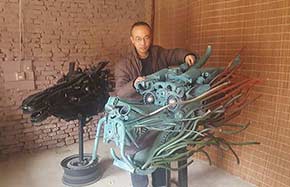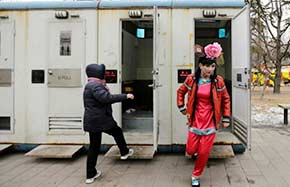Courts set to improve efficiency
Move aims to relieve burden of case hearings on Supreme People's Court, official says
Two new circuit courts-one in Nanjing, Jiangsu province, and the other in Zhengzhou, Henan province-were established on Wednesday to improve judicial efficiency and reduce the burden of case hearings on the Supreme People's Court.
All 12 presiding judges of the Third Circuit Court in Nanjing will be from the top court. The presiding judges, with an average age of 45, each have at least 10 years of experience.
The court will hear cases from Shanghai as well as Jiangsu, Zhejiang, Fujian and Jiangxi provinces. Judges specializing in finance, environmental protection and the internet have been chosen to work for the court.
The Fourth Circuit Court in Zhengzhou is responsible for hearing cases from Henan, Shanxi, Anhui and Hubei provinces.
Under the latest judicial interpretation issued by the top court on Wednesday, the current six circuit courts cover 26 provinces, municipalities and autonomous regions across China.
It also expanded the work of the First Circuit Court in Shenzhen, adding cases from Hunan province.
Jiang Bixin, vice-president of the Supreme People's Court and president of the Third Circuit Court, said circuit courts are responsible for 11 kinds of cases, including complicated administrative and criminal complaint cases. They also deal with letters and visitors appealing for help from the Supreme People's Court.
"Circuit courts ease the burden of the national top court," said Jiang, adding that cases within the jurisdiction of the Third Circuit Court from January to mid-December accounted for more than 25 percent of the country's total.
"They will also save time and money for litigants as they no longer have to go to the Supreme People's Court in Beijing," he said.
Jing Hanchao, president of the Fourth Circuit Court, said the establishment of circuit courts will help improve judicial credibility and maintain justice.
"Pronouncing the sentence in court will be encouraged to promote judicial credibility," Jing said. "Presiding judges and assistant judges will not be involved in cases from their hometowns."
He added that the courts will actively explore the mechanism of rational decentralization and effective supervision to ensure independent and fair verdicts.
Xie Fuzhan, Party chief of Henan, said the circuit court will help local courts to handle cross-regional cases effectively, which also benefits the judicial construction process in Henan and its neighboring provinces.
"It also reduces the cost of lawsuits," Xie said.
Jing said the four provinces in Central China recently achieved a new key stage in economic growth, which must be accompanied by judicial development.
Wang Yaxin, a professor at Tsinghua University, said the circuit courts are part of the Supreme People's Court. They aim to deal with cases with the support of the Supreme People's Court.
"It helps to improve the development of local judicial independence," Wang said.
According to the Supreme People's Court, another two circuit courts will be established in Chongqing municipality and Xi'an, Shaanxi province.
The first and second circuit courts were established in Shenzhen, Guangdong province, and Shenyang, Liaoning province, in 2014.
The First Circuit Court hears cases from Guangdong and Hainan provinces as well as the Guangxi Zhuang autonomous region, while the Second Circuit Court has jurisdiction over Liaoning, Heilongjiang and Jilin provinces.
Cao Yin contributed to this story.


















